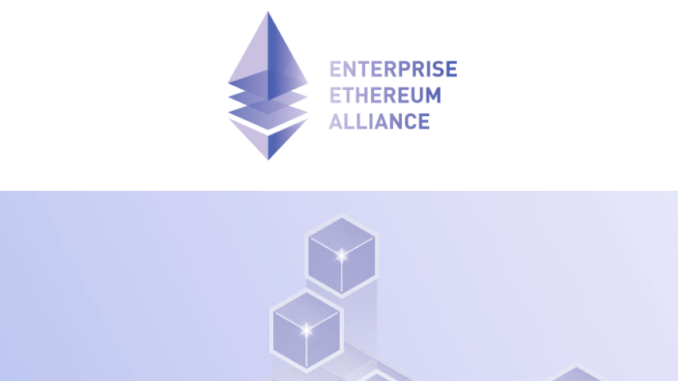
Today the Enterprise Ethereum Alliance (EEA) has announced that 14 leading law firms and academic institutions have joined the EEA’s Legal Industry Working Group.
The EEA believes that the Legal Working Group will prove foundational to the success of various efforts taking place within the organization.
New members joining the EEA and Legal Industry Working Group include:
- Cooley,
- Debevoise & Plimpton,
- Goodwin,
- Hogan Lovells,
- Holland & Knight,
- Jones Day,
- Latham & Watkins,
- Morrison & Foerster,
- Perkins Coie,
- Shearman & Sterling,
Plus,
- Cardozo Law School,
- Duke Center on Law & Technology
- Department of Legal Studies and Business Ethics at the University of Pennsylvania’s Wharton School.
Existing EEA members joining the EEA Legal Industry Working Group include BNY Mellon, ConsenSys, ING, and JPMorgan Chase & Co.
The EEA is an industry-supported, not-for-profit organisation established to build, promote, and broadly support Ethereum-based technology best practices, open standards, and open source reference architectures.
‘We are thrilled to see robust interest in blockchain technology by forward-looking law firms and institutions,’ said Aaron Wright, Chair of the EEA Legal Industry Working Group, Associate Clinical Professor and Co-Director of the Cardozo Law School’s Blockchain Project, and co-founder of the smart contract project OpenLaw, which Artificial Lawyer wrote about recently.
‘Lawyers are poised to serve as the catalysts for blockchain technology, and the Legal Working Group will serve as a neutral space to explore blockchain-based legal technology, develop standards for ‘smart’ legal agreements, support emerging enterprise use cases, and tackle important policy issues raised by this new impactful technology,’ he added.
The move comes amid a wave of similar groups and smart contract/blockchain platforms launching around the world, these include:
– OpenLaw – US and Swiss project, OpenLaw, which is a new smart contract platform that will allow lawyers to make legally binding and self-executing agreements on the Ethereum blockchain. The OpenLaw project is the brainchild of US-based Wright (noted above) and David Roon, and also has been supported by ConsenSys, a Swiss blockchain venture production company. Wright is an Associate Clinical Professor at Cardozo Law School and director of the school’s Blockchain Project.
– The Accord Project – US-based legal tech pioneer, Clause, is co-launching the world’s first smart contract consortium, alongside tech company Clio, blockchain platform Hyperledger and technology specialist law firm, Cooley, among others. The goal of the ground-breaking Accord consortium is to help bring together key players in the world of smart contract technology, blockchain and legal tech companies in general so that ideas and formats can be shared across the industry.
The third launch in this area will be called the Global Legal Blockchain Consortium and it will take place tomorrow (15th July at ILTACon 17). Its purpose is ‘to improve the security and interoperability of the global legal technology ecosystem’. Brian Kuhn from IBM Watson Legal is part of the project, along with tech experts from US law firms, Orrick and Baker Hostetler.
Of particular interest here is whether OpenLaw, which is the platform developed by Cardozo Law’s Wright, will be seen as the natural system to use in relation to smart contracts on the Ethereum blockchain. Given his role in both OpenLaw and the EEA’s Legal Industry Working Group this would seem a likely scenario. But, which smart contract platform the law firms listed above will favour is yet to be established, even if they appear to have voted with their feet in terms of the blockchain system they see as most promising.
1 Trackback / Pingback
Comments are closed.